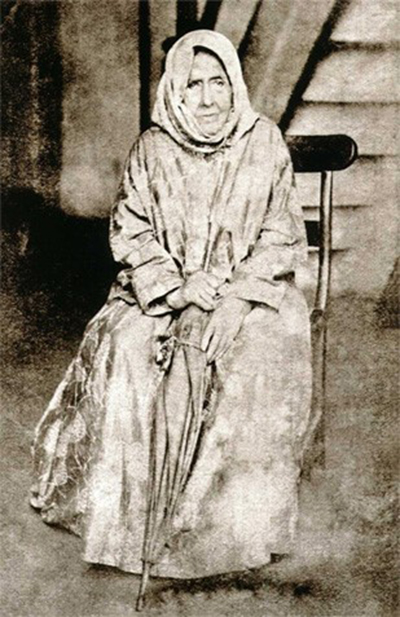
Nhá Chica: the sweet fragrance of Christ
Monday, June 27, 2016
Rogelio Zelada
The small chapel of the Blessed Sacrament shimmers with fragrant jasmines, carnations and lilies that Nhá Chica – as the townspeople call Francisca Paula de Jesús – has cut in the morning freshness to decorate the sanctuary of the parish in Baependi. She has been helped by her brother Teotonio, who is always at her side since their mother left them orphaned when Francisca was only 10 years old. She was born in 1808 in San Antonio del Río, in the Brazilian state of Minas Gerais, the daughter and granddaughter of slaves. With her mother, a freed black, and her brother, who was four years older than her, they migrated south to the town of Baependi, where she remained throughout her life.

Photo of Francisca Paula de Jesus, "Nhá Chica"
Nhá Chica and her brother, left alone and without resources, grew up begging from the good people of the town. They always relied on the protection of the Mother of God, the Immaculate Conception, whose small terracotta image – their only family heritage – accompanied them throughout their life. As a daughter familiarly does with her mother, Nhá Chica consulted the one whom she addressed as "my Lady" at all times.
Completely uneducated, unable to read or write, Nhá Chica demonstrated an extraordinary human and spiritual knowledge from a very young age. The evangelical certainty that God is hidden from the wise and lofty and revealed to the most humble and small was manifested in her. Not only did they live on alms, but they also helped all who were more poor and needy. As if loaves and fishes were multiplied in her hands, the great faith of this young black woman extended her charity to the poor of the city, and for that she soon became known as "the Mother of the Poor."
Nhá Chica knew how to comfort those who were sad, and to give wise and thoughtful advice to those who requested it. Her great spirit of prayer and sacrifice shed a light of wisdom that attracted all those seeking to clarify doubts, determine changes in life, and find success in their business and daily difficulties. Many even postponed their decisions until consulting with her.
Thus, her reputation for holiness grew and spread. People from all the towns and the villages of the region came to meet her, asking for prayers for their needs, and to alleviate their illnesses and physical and spiritual ailments. They always found in her a genuine interest in listening and serving them; she listened patiently, without haste, with deep compassion, feeling as her own the concerns and anxieties of those who sought her.
She reserved Fridays to do housework, but especially to devote the day to prayer and deep meditation on the passion and death of Christ.
A woman of great humility, she attributed her successes to daily prayer and her deep devotion to Our Lady of the Immaculate Conception. She received her greatest joy and most appreciated gift when someone read her texts from the Bible, especially any of the four Gospels.
Nhá Chica was an attractive, tall, beautiful woman, with a sweet and captivating goodness, who remained single all her life – although she did not lack good suitors. The daughter of slaves, she lived her freedom to do good to all; she was a lay person with an exemplary life, totally faithful to Christ, to the Church and the Gospel, who was seen by her people as a living saint.
With her effort and especially with alms collected over 30 years, the "little saint of Baependi" built a small shrine to the Blessed Mother, which grew to become what is known today as the Shrine of the Immaculate Conception. Pavilions were erected there to house and care for children and homeless people. Such great work was entrusted to the Franciscan Sisters of the Lord.
This important assistance center, home to more than 200 children, is the testimony in stone and flesh of the work done by this great Brazilian woman. Francisca Paula de Jesús, Nhá Chica died June 14, 1895, at almost 87 years old.
Since her death, she has received the veneration of all the people who immediately recognized her as a saint. Her body remained at the funeral chapel for several days and those who went in droves to pray testified that her body exuded an extraordinary scent of roses. This phenomenon was repeated during the exhumation of her remains at the beginning of the canonical process, which the episcopate of Brazil initiated 50 years after her death to ask the Church for her canonization.
Nhá Chica was buried in the chapel of the Immaculate Conception that she erected. There, her relics are preserved and venerated by thousands of devotees who come to thank God for her life.
She is the first Brazilian black woman to be declared blessed by Pope Francis, under the chairmanship of Cardinal Angelo Amato, prefect of the Congregation for the Causes of Saints.
She gave witness that holiness consists of living the ordinary in an extraordinary way, being available to the action of God at all times, and not just seeing the face of Christ in the poor but, above all, being the face of Christ for everyone.

